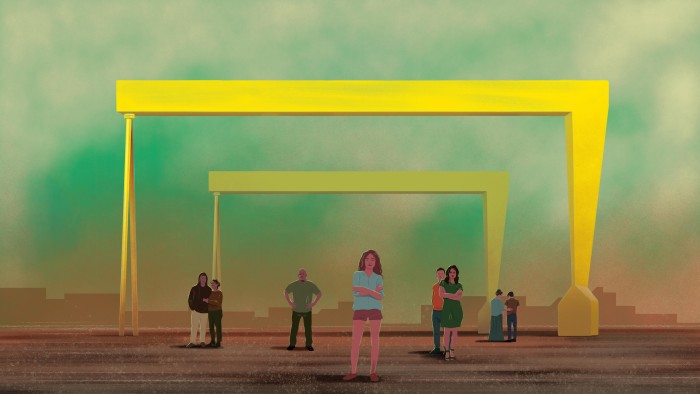Unlock the Editor’s Digest for free
Roula Khalaf, Editor of the FT, selects her favourite stories in this weekly newsletter.
Wendy Erskine’s first novel arrives after two collections that stake her claim to be the most talented Irish short story writer to emerge from either side of the border in the past decade. She has followed the path worn by her contemporaries Kevin Barry and Colin Barrett, with a career launched through first publication in the influential Dublin-based magazine Stinging Fly (where Sally Rooney was editor at the time), two books from its imprint, and acclaim beyond Ireland when British publishers displayed their usual keenness for Irish voices grown in its richer and more supportive literary culture.
Erskine began publishing fiction in her forties, all rooted in her native Belfast, where she works as a school teacher. The title story of Sweet Home (2018) is a masterpiece that exemplifies her strengths, roving through a variety of perspectives and social strata to vibrant comic effect before our deepening sense of character reveals the continuing effects of past tragedy on the present, and the threat of further tragedy to come. John Keats described Shakespeare’s ability to animate so many types of character without rationalising them, and it’s this negative capability that Erskine has in spades. She creates a form to express this power to its limits in The Benefactors: a polyphony of voices with one incident at its centre.
The plot initially suggests legal drama. Misty, a girl brought up by a cab driver after being deserted by her mother, meets three affluent boys through her job waiting at a fancy hotel. Among what marks Misty out to these boys as susceptible is her unsuccessful Only Fans-type account where she mostly just chats to lonely men (and where she has named her profile Elizabeth Barrett Browning, emulating the poet’s Victorian dress as seen on a classroom poster though not her hairstyle: “she’s hoping to make at least a little bit of cash”). At a party, she consents to sex with Chris, the boy she likes, but not to his invitation to invite his friends Lyness and Rami to join in. A police officer later speculates about what happened: “Do I think this, durationally, was entirely non-consensual? No. Do I think this, durationally, was entirely consensual? No.”
When she threatens Lyness with the police — “you’re not allowed to do that to people” — he laughs at her, confident his privilege will protect him. This taunt, and her courage in defying him, sets the events of the novel in progress, and is born as much from her fury that they see her as a lesser person as her sense of violation.
We get to know the main characters involved — Misty, her father, the boys, their mothers — in third-person chapters interspersed with 51 first-person vignettes that sometimes expand our knowledge of the core story and more often provide a kind of oral history of the contemporary Belfast in which the events of the novel take place. One of the lazier statements heard at literary festivals is that the setting of a novel is so strong it is “a character in its own right”. What Erskine understands more exactly is that a place comes alive most vividly through conveying the variety of its people.
Of the three boys, only Rami, the most sensitive, suffers a sense of guilt, and the novel more closely presents the perspectives of the parents. On one side there is Boogie, a taxi driver who has brought up Misty and her sister alone as a single parent, supported by the grandmother who raised him. On the other side, a trio of mothers form an unlikely alliance to protect their sons. Frankie is glamorous and withdrawn, formed by her past in a care home, and fulfilling the bargain of her marriage to an older tech millionaire through meticulous attention to her looks. Bronagh is a virtue-signalling hypocrite who runs a charity for deprived teenagers at the same time as dehumanising the girl her son abused. Miriam, grieving her husband, is the kindest and funniest, having known more of real happiness than any of the others, and this will lead her to suffer the most along with her son and Misty.
In these sections the voice is intimate and flexible, inviting us to ridicule a character’s failings one minute and understand them the next, offering and then resisting caricature. Through the interplay with first-person vignettes we gain a panorama of character that includes what these people no longer know about themselves. Boogie, the put-upon cabbie, perhaps the moral hero of the novel, is remembered in a little vignette for his extraordinary talent as a visual artist at school. “You ever been around talented people? Like I don’t think I’ve ever been around talented people apart from Boogie Downes.” But when we are in Boogie’s point of view we sense sadly that he has forgotten about this earlier version of himself altogether, driven by a stoical commitment to making a realistic living and supporting his daughters.
The novel never reaches the court-case scenario we know well from TV, and is richer for that. The tapestry of so many voices is natural and expansive, if some of the vignettes are slight to the point of dilution. It’s a small caveat — the reader will come away from the book with a sense of a writer of an unrivalled range of imaginative empathy, and of a city teeming with joy and sadness.
The Benefactors by Wendy Erskine, Sceptre £18.99, 336 pages
Join our online book group on Facebook at FT Books Café and follow FT Weekend on Instagram, Bluesky and X




